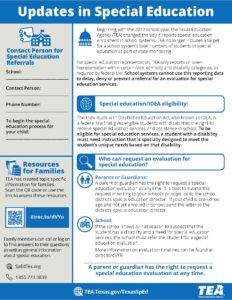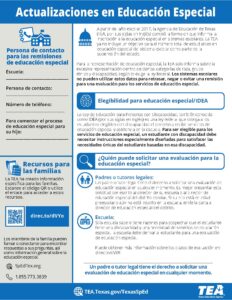What is Special Education?
UT-UCS Special Education Department
The Individual with Disabilities Education Act (IDEA), revised in 2004, includes four major components:
- Free and appropriate public education, including related services that can range from speech therapy to transportation and health screenings;
- A least restrictive environment (LRE);
- An Individualized Educational Program (IEP);
- Due process procedures for parents, guardians, and children.
Records Request
To request special education records, please:
- TRex a request to the campus (district number is 227806)
- Submit a Frontline records request, or
- Contact the campus registrar. For a list of our registrars and the campuses they serve, please see our registrar list here: https://utcharter.org/student-recordspeims/
Child Find
The purpose of Child Find is to locate, identify and evaluate children from birth to 21 years of age with disabilities and their possible need for special education and related services. Child Find is a free referral and information service available to local education agencies and Education Service Center Region 13.
Children learn at different rates but some children have significant difficulty in one or more of the following areas: social interaction, play, speech and language, vision, hearing, attention, behavior, or coordinating movements. We’re here to help you access services to meet the unique learning needs of your child. If you are concerned that your child may be learning, playing or interacting differently from others, please call the special education department of your local education agency or ESC Region 13 staff listed below.
The information contained in the link below is intended to provide Texas families with information regarding the Individuals with Disabilities Education Act (IDEA), Dyslexia, Multi-Tiered Systems of Support, and Section 504 of the Rehabilitation Act of 1973.
https://tea.texas.gov/academics/special-student-populations/special-education/resources
La información contenida en el enlace a continuación tiene como objetivo proporcionar a las familias de Texas información sobre la Ley de Educación para Personas con Discapacidades (IDEA), Dislexia, Sistemas de Apoyo de Varios Niveles y la Sección 504 de la Ley de Rehabilitación de 1973. –https://tea.texas.gov/academics/special-student-populations/special-education/resources
SB 139 Notice to Families / SB 139Aviso a las familias
Download the Update here: Updates-on-Special-Education fall 22
Descarga la Actualización aquí: updates-on-special-education-spanish
Direct Link to Resources from the Texas Education Agency
For information directly from the Texas Education Agency (TEA) on IDEA, Dyslexia, MTSS and Section 504, please see their website:
https://tea.texas.gov/academics/special-student-populations/special-education/resources
Compensatory Services / Servicios Compensatorios
Resources below can assist parents whose children may have been previously delayed or denied an evaluation under the IDEA in requesting compensatory services for their child. A copy of the Delayed or Denied Evaluations & Compensatory Services flyer is provided to all families of students with disabilities and is posted in the administrative offices of all campuses.
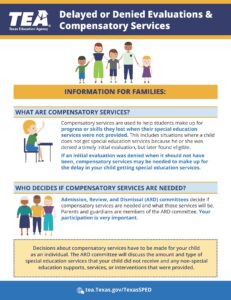
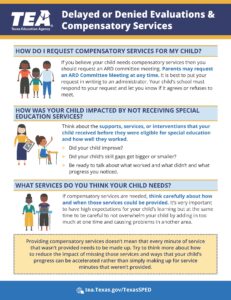
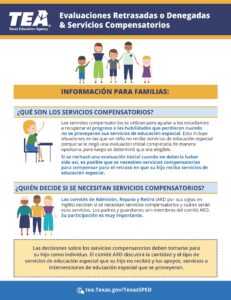
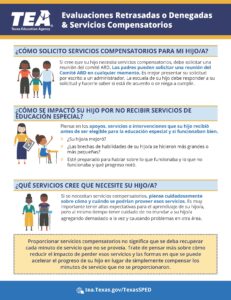
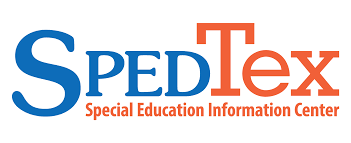
The Special Education Information Center (SPEDTex) provides resources and interactive features for increasing family awareness of disabilities and special education processes, with the goal of improving partnerships between schools and families.
Contact information:
Website: www.spedtex.org
Phone: 1-855-773-3839
Email: inquire@spedtex.org
Live Chat: www.spedtex.org
Resources
- Child Find
- Updates for Special Education Referral- UT Charter updates in sped
- Actualizaciones para educación especial-Remisión- UT Charter updates-spanish
- Key Elements of Early Transition from ECI to PPCD
- State Performance Plan Indicator
- Least Restrictive Environment
- Notice of Procedural Safeguards (English) 2/2021
- Aviso de garantias procesales (espanol) 2/2021
- Parents Guide to the ARD Process (English) 2/2021
- Guia para padres del proceso de ARR (espanol) 2/2021
The intent of the IDEA is for children with disabilities to be educated with their peers who do not have disabilities to the maximum extent possible. IDEA (2004) specifically states that:
“To the maximum extent appropriate, children with disabilities, including children in public or private institutions or other care facilities, are educated with children who are not disabled, and special classes, separate schooling, or other removals of children with disabilities from the regular educational environment occurs only when the nature or severity of the disability of a child is such that education in regular classes with the use of supplementary aids and services cannot be achieved satisfactorily.” [Section 612(a)(5)(A)]
Individual Education Plan
Each of our special education students has an Individual Education Plan (IEP). The plan specifies the services that will be provided for the student, including the length of services and the venue in which they will be delivered. The IEP clearly states the child’s current levels of academic achievement and functional performance. It states the goals for the coming year and consistently monitors individual progress. These services and guidelines are determined jointly by the ARD committee which consists of school professionals and the parent or guardian.
Due Process Procedures
TEA designed the Special Education Dispute Resolution Handbook to assist parents, school officials, and other interested parties with understanding TEA’s special education dispute resolution system. The handbook contains information about the due process hearings program including FAQs. It is not intended to be legal advice. If you need legal advice about a special education matter you should contact a private attorney. The Special Education Dispute Resolution Handbook is also available in Spanish.
Parents are notified of the time and place for the annual review. A parent is not legally bound to attend the meeting, but we at the University Charter School do everything we can to ensure that they have the opportunity to be present. Notice is given of each evaluation instrument, procedure, test, record, or report the school has used as basis for changes in the IEP. If the parent or guardian needs help in understanding the instruments or procedures, they are welcome to meet with us. They may also seek outside help if they wish.
Transition
For information and resources about secondary transition and post-school results visit Transition in Texas at www.transitionintexas.org.
Transition and Employment Guide
Guía de transición y empleo de Texas
education resources, supplies and/or services. SSES credits of up to $1,500 per student, supplement the services/supports provided by the school for the student. Review the Program Overview and Eligibility Requirements to verify if your student meets the eligibility criteria here:
Review the Program Overview and Eligibility Requirements to verify if your student meets the eligibility criteria here:
Frequently Asked Questions (FAQ):
https://tea.texas.gov/academics/special-student-populations/special-education/sses-frequently-asked-questions-faqs
If you feel that your student meets the eligibility criteria, an application is submitted online. The steps to apply for SSES are here:
https://tea.texas.gov/academics/special-student-populations/specialeducation/sses-how-to-apply
After completing the application, families will be notified within 30 business days if the student has been approved, placed on a waiting list or does not qualify.



